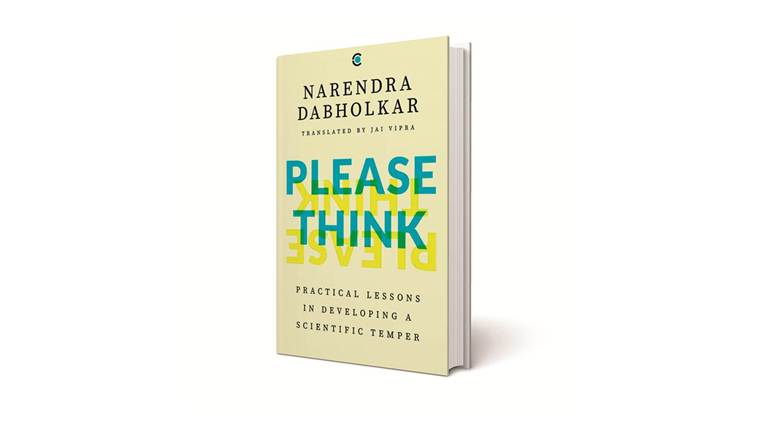A collection of essays that champion reason over blind faith, science over superstition
Written by Biswadeep Ghosh
Book: Please Think: Practical Lessons in Developing a Scientific Temper
Author: Narendra Dabholkar. Translated by Jai Vipra Context
Pages: 143 pages
Price: Rs 299
Assassinated on 20 August 2013, Narendra Achyut Dabholkar was a medical doctor, author, activist and the founder of the Maharashtra Andhashraddha Nirmoolan Samiti (MANS). A rationalist who led an anti-superstition movement, he raised his voice against blind faith through his speeches and writings. Dabholkar was an opponent of black magic, sacrifices, astrology, and casteism, evils the society hasn’t been unable to get rid of. He was a seeker of meaningful change, knowing that it won’t take place overnight.
Translated by Jai Vipra, Please Think: Practical Lessons in Developing a Scientific Temper is the second of Dabholkar’s books originally written in Marathi and now available in English. The book is a collection of essays, mostly short, which emphasise the need for doing away with unquestioning faith in the so-called absolute truths established by religion and tradition. Nothing, it broadly argues, must be accepted at face value without scientific scrutiny.
The writer asks complex philosophical questions, among them those that have no easy answers. He does so with the use of anecdotes from personal experiences for the most part, which keeps the reader engaged.
Religion is arrogant because it eliminates the possibility of discussions and debates on ‘facts.’ Science, on the contrary, is humble. No theory is absolute. It can be questioned, analysed and dismissed by a newer argument that seems more acceptable and is based on concrete proof. Aristotle had claimed that women had fewer teeth than men without checking, Dabholkar reminds the reader. Aristotle’s theory was based on speculation, which cannot be mistaken for a scientific approach.
Does science find answers with ease? It does not. Predictably, the author is thoroughly disappointed with people with degrees in science who promote unscientific thinking. Many such charlatans inhabit and flourish in the modern-day society, which impedes progress in the right direction.
In ‘Religious Inquiry and Rationalism’, the author explains why religion exercises enormous power over the human mind. Not only has it been in existence for centuries before science came into being, but the average person is also introduced to it at a very early age. Practices in existence for centuries continue to be nurtured by modern society, an example being Kumbh Mela, where sins accumulated over 12 years can be washed away with a single bath. While Maharashtra doesn’t have basic educational facilities for the state’s children, Rs 30 crore are spent on one such mela in Nashik. Such extravagance needs to be checked, but the chances of that happening are less than remote.
To illustrate his arguments, Dabholkar uses instances from day-to-day life freely. He agrees that many inexplicable occurrences don’t have easy and quick explanations, but also reminds the reader that rational answers can be found with time. He talks about a girl who made dolls. One day, black marks started appearing on whichever doll she touched. What made it happen? There was an answer, although it wasn’t easy to find.
He rejects astrology by insisting that astrologers make obvious predictions — such as the child will get married at an appropriate time — instead of giving answers to tough questions like where will an earthquake occur, when, and on what scale of intensity. Astrology, in other words, must not be accepted by the mind that asks questions and seeks rational answers.
While technology is playing a key role in taking society forward, we continue to live in a country where people suffering from snakebites are subjected to holy chants instead of being taken to a medical doctor. This is the same society where nobody asks why the Almighty Creator, who ‘shows’ himself to certain people, looks exactly like a man. People lose sight of reason when their minds are governed by blind faith. Dabholkar makes his argument with examples and inferences, hoping that his reader will internalise the essence.
In ‘A superstition emergency’, he notes, “Superstition is evil. All its manifestations are dangerous. But what is the most poisonous form of superstition? It is the wanton transformation of faith into superstition.” Despite what the Constitution of India and the education policy says about scientific temper and inculcating scientific thinking, the tragic fact of our times is that superstitions abound.
A criminal law in Maharashtra, the Maharashtra Prevention and Eradication of Human Sacrifice and other Inhuman, Evil and Aghori Practices and Black Magic Act, 2013, was originally drafted by Dabholkar. Please Think tells us why this act must be in place, and not only in Maharashtra.
Biswadeep Ghosh is a freelance journalist, author and teacher
Source: Read Full Article


